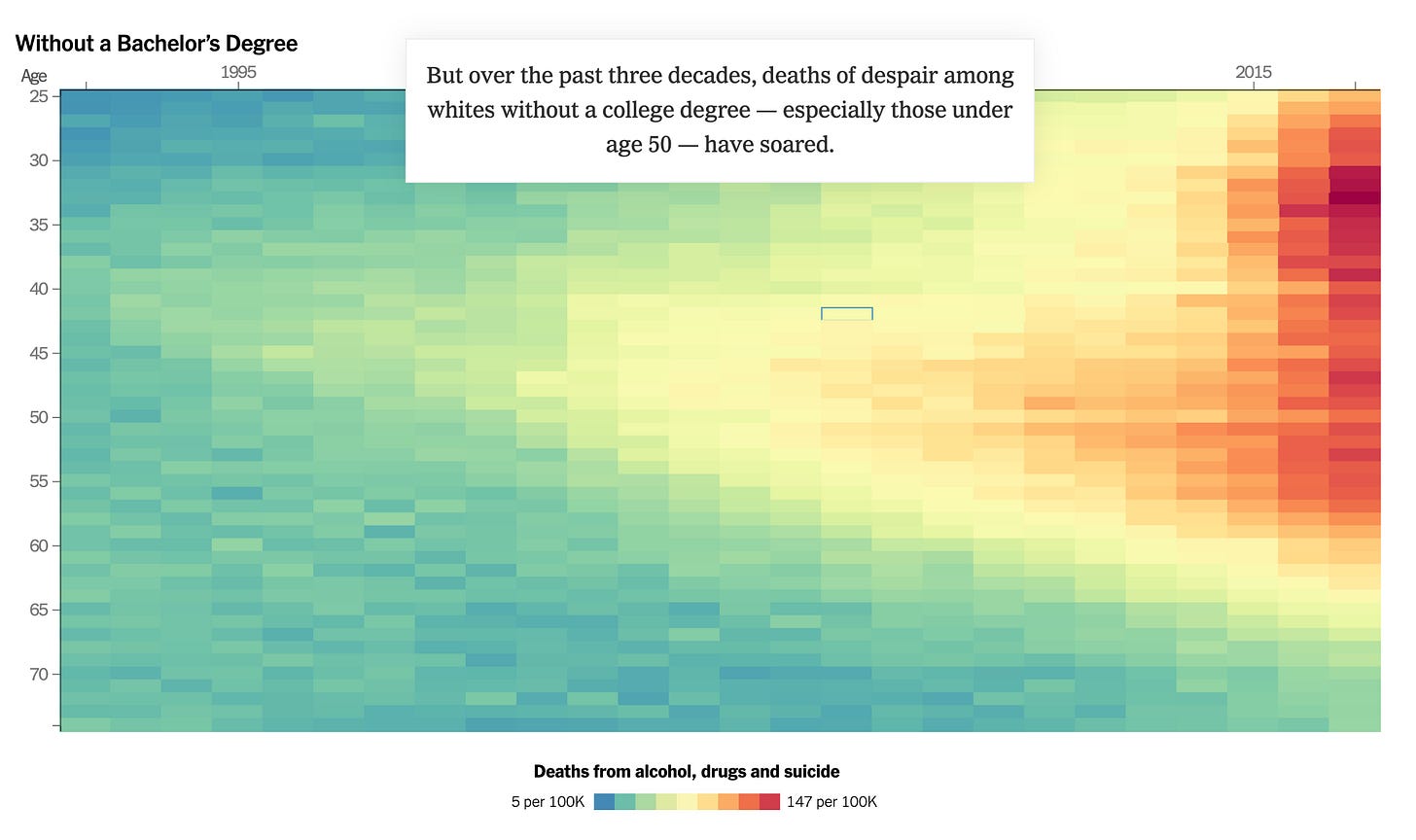Mind Matters
A Honduran Helicopter & Participatory Socialism
Hello humans,
I’m really excited to share the most recent episode of the podcast, in which I speak with Glen Weyl:

Glen co-authored the provocative book Radical Markets: Uprooting Capitalism and Democracy for a Just Society. He also started and runs the RadicalxChange foundation. His economic ideas are wonderfully confusing - it’s unclear whether he’s on the left, the right, or another spectrum altogether.
We speak about:
How social technologies and economic institutions shape our physical, mental, and social lives
The myth of individualism
How does RadicalxChange compare & contrast with Piketty’s progressive taxation approach?
How to design markets beyond neoliberalism, as mechanisms for complexity
UBI, and the role of art in building organic movements
If you’re interested, you can visit the episode page here:
Working Class Life is Killing Americans
The NYT published another funky interactive graph-essay recently, this time reviewing Angus Deaton & Anne Case’s recent book, Deaths of Despair and the Future of Capitalism.
Their thesis is blunt: more working class people are killing themselves.
Five years ago, they observed the rise in ‘deaths of despair’ in working class white people. Their recent book finds the trend extends beyond racial demographics.

This next graph is much more fun if you read the article - it’s interactive:

The causes they point to are familiar: inequality is rising sharper in the US than any other comparable economy. Corporations reap the bulk of economic growth, increasing market share and focusing on stock buybacks. Labor unions are deflated and weak, leaving workers with little to no bargaining power. Healthcare costs continue to demand larger percentages of people’s budget.
A Poor Honduran Man Has Been Building a Helicopter From Dumpster Garbage in His Garage for 50 Years
A wonderful 10-minute documentary about a paraplegic man living in a Honduran village who has been building a helicopter from salvaged parts and garbage in his garage.
In a poignant scene where he laments his inability to do grandiose, ‘incredible’ things, both due to his paraplegia and living in poverty in Honduras, he delivers the line:
“The problem is that everything is incredible, but people don’t accept that”
I’m glad to exist in this world, in which a paraplegic man, somewhere in Honduras, has devoted his life to building a helicopter against all odds. There’s beauty in the absurdity of it (not to mention the beauty of devotion). Absurdity is sometimes the most potent means to shock ourselves out of hedonic adaptation to our existential situation, out here floating on a rock in space, where the very fabric of the universe is unknown to us (dark energy, warped spacetime).
Sometimes, this is how I think about the point of economic reform: to enable a proliferation of absurdity, a society full of non-sense that challenges the air-tight narratives we’ve built for ourselves to make sense of where we are and how we might live.
Fuck it, build a helicopter!
Thomas Piketty’s Participatory Socialism
Piketty, author of the infamous Capital in the 21st Century, just released his latest book: Capital and Ideology. It’s over 1,000 pages, so it’ll take time to process. But my initial reading suggests that his project is to lay out the history of inequality in order to justify the transcendence of capitalism.
“The study of history”, Piketty writes:
“…has convinced me that it is possible to transcend today’s capitalist system and to outline the contours of a new participatory socialism for the twenty-first century...what makes historical change possible is above all the existence of social and political mobilizations for change and concrete experimentation with alternative arrangements.”
He calls his vision participatory socialism.
He proposes a series of steeply progressive taxes: wealth tax (property tax + inheritance tax), income taxes, and a carbon tax.
He has a slightly unorthodox way of suggesting the particular tax rates, using multiples, displayed below:

His version of basic income is not universal, but more like a negative income tax. He sets the basic income level at 60% of average after-tax income. So if the average income in the economy is $59,000, as it is in the US today, then the basic income level would be $35,400. As you begin earning more than this, your basic income receipt would decline.
He writes, “It would apply to about 30 percent of the population for a total cost of about 5 percent of national income” (just over $1 trillion).
These taxes are used to fund a universal capital endowment of roughly $100,000 per person upon reaching a designated age (he proposes 25, like an inheritance but for everyone. A progress inheritance), the basic income (that phases out as personal income rises), universal healthcare, and egalitarian education reform.
He also proposes a few structural changes, like codetermination that places workers on company boards to distribute power and democratize decision making.
These reforms are all meant to foster two broader, ideological changes: social ownership and the circulation of capital. He writes:
“the model of participatory socialism proposed here rests on two key pillars: first, social ownership and shared voting rights in firms, and second, temporary ownership and circulation of capital…By combining them, we can achieve a system of ownership that has little in common with today’s private capitalism; indeed, it amounts to a genuine transcendence of capitalism.”
Anyway. Looks like it’ll be a spicy read.
That’ll Do.
As always, you can respond directly to this email with thoughts or suggestions. Let’s start a conversation.
If you have a friend who might enjoy this newsletter, consider sharing the link. The more people on this network, the more possibilities we can cook up.
Until next time,
Oshan